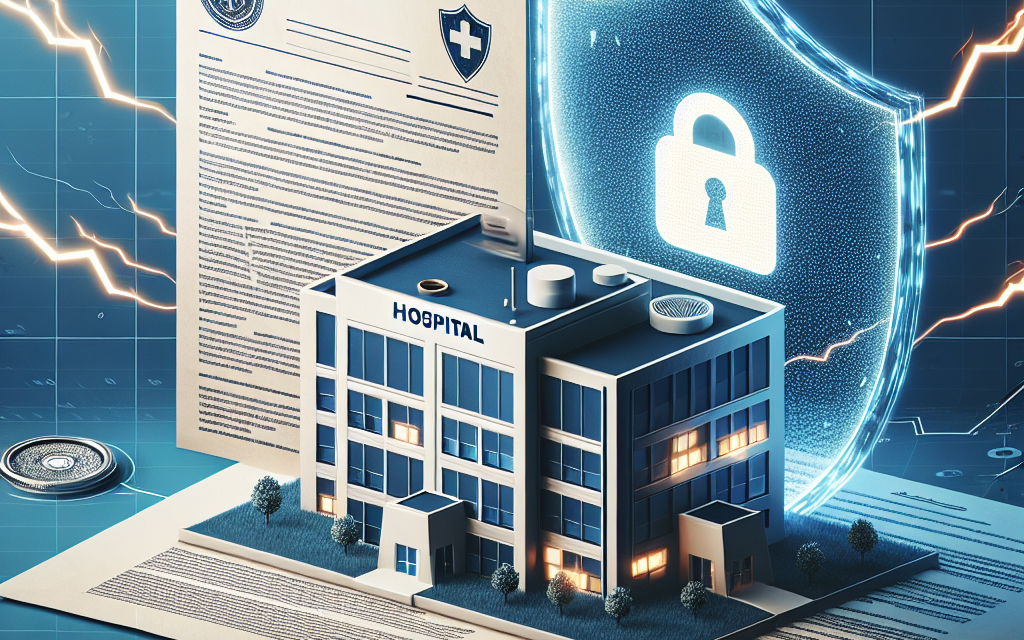New House Bill Seeks to Safeguard Against Hospital Cyberattacks
In an era where technology is deeply integrated into healthcare, the threat of cyberattacks on hospitals has become a pressing concern. The recent introduction of a new House bill aims to address these vulnerabilities and enhance the cybersecurity framework within healthcare institutions. This article delves into the implications of this legislation, the current state of hospital cybersecurity, and the measures that can be taken to protect sensitive patient data.
The Growing Threat of Cyberattacks in Healthcare
The healthcare sector has increasingly become a target for cybercriminals. According to a report by the Cybersecurity & Infrastructure Security Agency (CISA), healthcare organizations experienced a staggering 50% increase in cyberattacks in 2021 compared to the previous year. This surge can be attributed to several factors:
- Valuable Data: Hospitals store vast amounts of sensitive patient information, including personal identification, medical histories, and financial data, making them lucrative targets for hackers.
- Inadequate Security Measures: Many healthcare facilities, especially smaller ones, lack robust cybersecurity protocols due to budget constraints and a lack of technical expertise.
- Ransomware Attacks: Ransomware has emerged as a prevalent threat, where attackers encrypt hospital data and demand payment for its release. The average ransom paid by healthcare organizations has skyrocketed, with some reports indicating figures exceeding $1 million.
These factors underscore the urgent need for legislative action to bolster cybersecurity in hospitals. The new House bill aims to address these challenges by implementing comprehensive measures to protect healthcare institutions from cyber threats.
Overview of the New House Bill
The proposed House bill, known as the “Healthcare Cybersecurity Protection Act,” seeks to establish a framework for enhancing cybersecurity across healthcare organizations. Key provisions of the bill include:
- Mandatory Cybersecurity Assessments: Hospitals will be required to conduct regular cybersecurity assessments to identify vulnerabilities and implement necessary improvements.
- Funding for Cybersecurity Initiatives: The bill allocates federal funding to support hospitals in upgrading their cybersecurity infrastructure and training staff on best practices.
- Collaboration with Federal Agencies: The legislation encourages collaboration between healthcare organizations and federal cybersecurity agencies to share threat intelligence and best practices.
- Incident Reporting Requirements: Hospitals will be mandated to report cyber incidents to federal authorities within a specified timeframe, ensuring timely responses to threats.
- Public Awareness Campaigns: The bill includes provisions for public awareness campaigns to educate patients about the importance of cybersecurity in healthcare.
This legislation represents a significant step forward in addressing the cybersecurity challenges faced by hospitals. By mandating assessments and providing funding, the bill aims to create a more resilient healthcare system capable of withstanding cyber threats.
Impact on Healthcare Organizations
The implementation of the Healthcare Cybersecurity Protection Act will have far-reaching implications for healthcare organizations. Here are some potential impacts:
- Increased Investment in Cybersecurity: Hospitals will need to allocate resources to comply with the new requirements, leading to increased investment in cybersecurity technologies and personnel.
- Enhanced Patient Trust: By demonstrating a commitment to cybersecurity, hospitals can enhance patient trust and confidence in their ability to protect sensitive information.
- Improved Incident Response: With mandatory incident reporting and collaboration with federal agencies, hospitals will be better equipped to respond to cyber incidents swiftly and effectively.
- Standardization of Cybersecurity Practices: The bill may lead to the establishment of standardized cybersecurity practices across the healthcare sector, promoting consistency and reliability.
- Potential Challenges: While the bill aims to improve cybersecurity, it may also pose challenges for smaller healthcare organizations that may struggle to meet the new requirements due to limited resources.
Overall, the impact of the new House bill on healthcare organizations will be significant, driving improvements in cybersecurity practices and fostering a culture of vigilance against cyber threats.
Case Studies: Lessons from Recent Cyberattacks
To understand the urgency of the new legislation, it is essential to examine recent high-profile cyberattacks on healthcare organizations. These case studies highlight the vulnerabilities within the sector and the consequences of inadequate cybersecurity measures.
1. The Colonial Pipeline Attack
In May 2021, the Colonial Pipeline, a major fuel pipeline operator, fell victim to a ransomware attack that disrupted fuel supplies across the Eastern United States. While not a healthcare organization, the attack had significant implications for hospitals relying on fuel for operations. The incident underscored the interconnectedness of critical infrastructure and the potential ripple effects of cyberattacks.
2. The Universal Health Services (UHS) Attack
In September 2020, UHS, one of the largest healthcare providers in the U.S., experienced a ransomware attack that forced the shutdown of its IT systems. The attack disrupted patient care, delayed surgeries, and led to significant financial losses. UHS reported that the incident cost the organization over $67 million in recovery efforts. This case illustrates the devastating impact of cyberattacks on patient care and organizational finances.
3. The Scripps Health Incident
In May 2021, Scripps Health, a California-based healthcare provider, suffered a ransomware attack that compromised patient data and disrupted services. The attack forced Scripps to divert ambulances and delay patient appointments, highlighting the operational challenges posed by cyber incidents. The incident prompted calls for stronger cybersecurity measures within the healthcare sector.
These case studies emphasize the need for proactive measures to safeguard against cyber threats. The new House bill aims to address these vulnerabilities by mandating assessments, funding initiatives, and promoting collaboration among healthcare organizations.
Best Practices for Hospital Cybersecurity
As hospitals prepare to comply with the new legislation, it is crucial to adopt best practices for cybersecurity. Here are some key strategies that healthcare organizations can implement:
- Regular Security Assessments: Conducting regular security assessments can help identify vulnerabilities and ensure that appropriate measures are in place to mitigate risks.
- Employee Training: Providing ongoing training for staff on cybersecurity best practices is essential. Employees should be educated on recognizing phishing attempts, securing devices, and reporting suspicious activities.
- Data Encryption: Encrypting sensitive patient data can protect it from unauthorized access, even in the event of a breach.
- Incident Response Plans: Developing and regularly updating incident response plans can ensure that hospitals are prepared to respond swiftly to cyber incidents, minimizing disruption to patient care.
- Collaboration with Cybersecurity Experts: Partnering with cybersecurity experts can provide hospitals with the knowledge and resources needed to enhance their security posture.
By implementing these best practices, healthcare organizations can strengthen their defenses against cyber threats and comply with the requirements set forth in the new House bill.
Conclusion: A Step Towards a Safer Healthcare Future
The introduction of the Healthcare Cybersecurity Protection Act marks a significant milestone in the fight against cyberattacks on hospitals. As the healthcare sector continues to evolve and embrace technology, the need for robust cybersecurity measures has never been more critical. The bill’s provisions for mandatory assessments, funding, and collaboration with federal agencies will help create a more resilient healthcare system capable of withstanding cyber threats.
As hospitals prepare to comply with the new legislation, it is essential to adopt best practices for cybersecurity and foster a culture of vigilance among staff. By prioritizing cybersecurity, healthcare organizations can protect sensitive patient data, enhance patient trust, and ensure the continuity of care in the face of evolving cyber threats.
In conclusion, the new House bill is a proactive step towards safeguarding the healthcare sector against cyberattacks. By addressing vulnerabilities and promoting collaboration, it lays the groundwork for a safer and more secure healthcare future.





